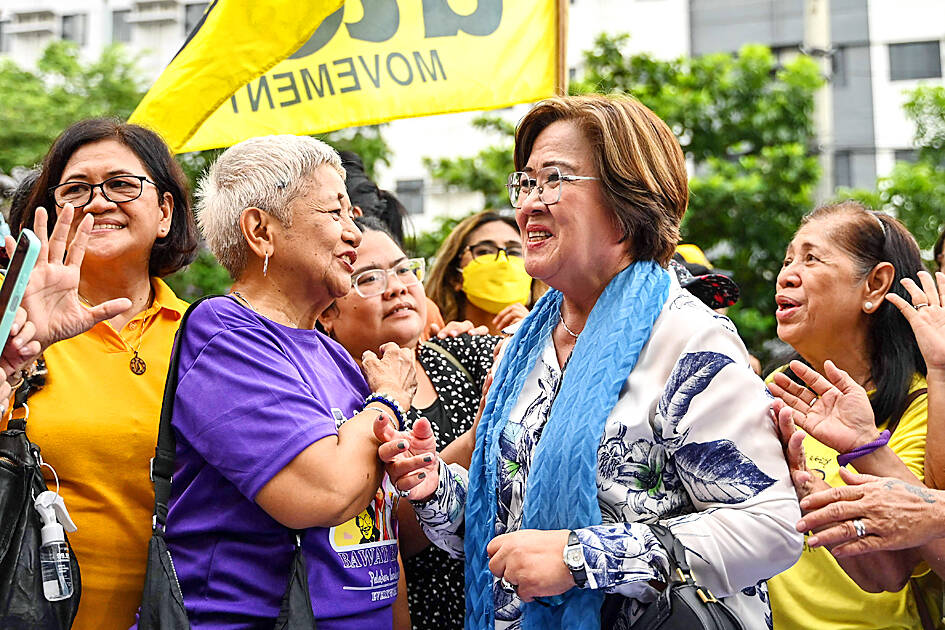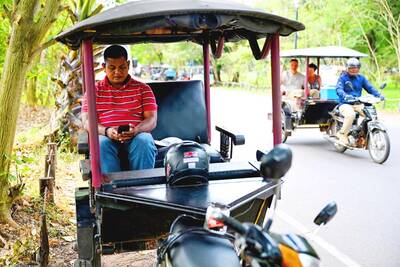A Philippine court yesterday dropped all remaining criminal charges against human rights campaigner Leila de Lima, ending years of legal battles for one of the most vocal and powerful critics of former Philippine president Rodrigo Duterte and his deadly drug war.
The former senator and secretary of justice had spent a decade investigating “death squad” killings allegedly orchestrated by Duterte until she was arrested in 2017 and spent more than six years in prison.
“I am now completely free and vindicated. It’s very liberating,” an emotional De Lima told reporters as she emerged from the Muntinlupa City Regional Trial Court Branch in Metro Manila.

Photo: AFP
“Despite the pain and injustice of it all, I went through it and endured the whole process,” she said.
De Lima had been freed on bail in November last year, having earlier been cleared of the two other drugs charges.
Her lawyer, Filibon Tacardon, said the final case was dismissed for insufficient evidence. The court did not immediately release the text of the ruling.
The 64-year-old De Lima vowed that Duterte would not go scot-free for the drug war killings, as well as her imprisonment.
“This is my message to the former president, Mr Duterte: Now it’s your turn to answer for your sins against the people,” she said.
De Lima was a sitting senator when she was arrested in 2017 and spent more than six years in jail while on trial for three drug trafficking charges.
She described the cases as payback for her efforts to investigate Duterte’s drug war, first as head of the government’s independent human rights body, then as secretary of justice and during her term as a senator.
The last drug case concerned allegations she took money from inmates inside the nation’s largest prison to allow them to sell drugs while she was justice secretary from 2010 to 2015.
She had maintained that the charges, which carried a maximum penalty of life in prison, were fabricated to silence her from criticizing Duterte’s narcotics crackdown that left thousands dead.
Multiple witnesses, including prison gang bosses, died or recanted their testimonies during the lengthy trials.
Also yesterday, the court dismissed another charge alleging de Lima had persuaded a former employee to ignore a 2016 summons issued by the House of Representatives for a hearing on the alleged trade of illegal drugs in prisons.
Before her arrest, De Lima spent a decade investigating Duterte’s drug war during his time as mayor of the southern city of Davao and early in his 2016-2022 presidency.
Thousands of drug suspects were killed by police and unknown gunmen in a campaign that became the centerpiece of Duterte’s 2016-2022 rule, a crackdown that critics described as state-sponsored extrajudicial killings and is now a subject of an investigation by the International Criminal Court.
De Lima yesterday said she would continue to help the tribunal in its probe.

The death of a former head of China’s one-child policy has been met not by tributes, but by castigation of the abandoned policy on social media this week. State media praised Peng Peiyun (彭珮雲), former head of China’s National Family Planning Commission from 1988 to 1998, as “an outstanding leader” in her work related to women and children. The reaction on Chinese social media to Peng’s death in Beijing on Sunday, just shy of her 96th birthday, was less positive. “Those children who were lost, naked, are waiting for you over there” in the afterlife, one person posted on China’s Sina Weibo platform. China’s

‘NO COUNTRY BUMPKIN’: The judge rejected arguments that former prime minister Najib Razak was an unwitting victim, saying Najib took steps to protect his position Imprisoned former Malaysian prime minister Najib Razak was yesterday convicted, following a corruption trial tied to multibillion-dollar looting of the 1Malaysia Development Berhad (1MDB) state investment fund. The nation’s high court found Najib, 72, guilty on four counts of abuse of power and 21 charges of money laundering related to more than US$700 million channeled into his personal bank accounts from the 1MDB fund. Najib denied any wrongdoing, and maintained the funds were a political donation from Saudi Arabia and that he had been misled by rogue financiers led by businessman Low Taek Jho. Low, thought to be the scandal’s mastermind, remains

Australian Prime Minister Anthony Albanese yesterday announced plans for a national bravery award to recognize civilians and first responders who confronted “the worst of evil” during an anti-Semitic terror attack that left 15 dead and has cast a heavy shadow over the nation’s holiday season. Albanese said he plans to establish a special honors system for those who placed themselves in harm’s way to help during the attack on a beachside Hanukkah celebration, like Ahmed al-Ahmed, a Syrian-Australian Muslim who disarmed one of the assailants before being wounded himself. Sajid Akram, who was killed by police during the Dec. 14 attack, and

VISHNU VANDALS: A Cambodian official accused Thailand of destroying a statue in a disputed border area, with video showing the Hindu structure being torn down The Thai military said ceasefire talks with Cambodia, set to begin yesterday, are expected to conclude with a meeting of the countries’ defense ministers on Saturday, as the two sides seek to end weeks of deadly clashes. The talks started at 4pm in Thailand’s Chanthaburi Province, which borders Cambodia. The Thai Ministry of Defense outlined several demands to be discussed ahead of the bilateral meeting of the General Border Committee (GBC) on Saturday. If secretariat-level discussions fail to reach agreement on key technical frameworks such as troop deployments, the Thai side would not proceed with the GBC meeting or sign any agreement on